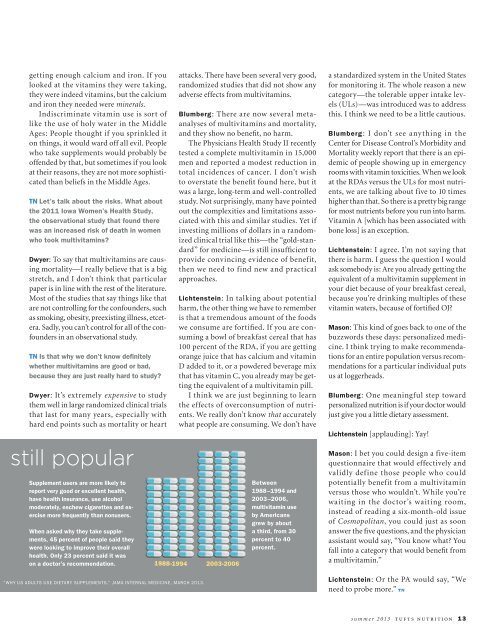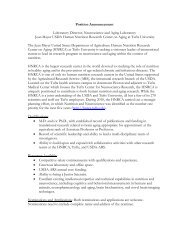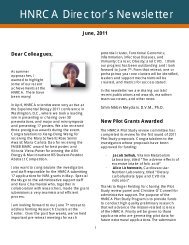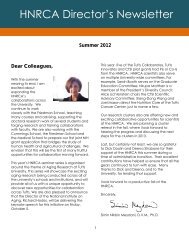Microbiome - Human Nutrition Research Center on Aging - Tufts ...
Microbiome - Human Nutrition Research Center on Aging - Tufts ...
Microbiome - Human Nutrition Research Center on Aging - Tufts ...
You also want an ePaper? Increase the reach of your titles
YUMPU automatically turns print PDFs into web optimized ePapers that Google loves.
getting enough calcium and ir<strong>on</strong>. If you<br />
looked at the vitamins they were taking,<br />
they were indeed vitamins, but the calcium<br />
and ir<strong>on</strong> they needed were minerals.<br />
Indiscriminate vitamin use is sort of<br />
like the use of holy water in the Middle<br />
Ages: People thought if you sprinkled it<br />
<strong>on</strong> things, it would ward off all evil. People<br />
who take supplements would probably be<br />
offended by that, but sometimes if you look<br />
at their reas<strong>on</strong>s, they are not more sophisticated<br />
than beliefs in the Middle Ages.<br />
TN Let’s talk about the risks. What about<br />
the 2011 Iowa Women’s Health Study,<br />
the observati<strong>on</strong>al study that found there<br />
was an increased risk of death in women<br />
who took multivitamins?<br />
Dwyer: To say that multivitamins are causing<br />
mortality—I really believe that is a big<br />
stretch, and I d<strong>on</strong>’t think that particular<br />
paper is in line with the rest of the literature.<br />
Most of the studies that say things like that<br />
are not c<strong>on</strong>trolling for the c<strong>on</strong>founders, such<br />
as smoking, obesity, preexisting illness, etcetera.<br />
Sadly, you can’t c<strong>on</strong>trol for all of the c<strong>on</strong>founders<br />
in an observati<strong>on</strong>al study.<br />
TN Is that why we d<strong>on</strong>’t know definitely<br />
whether multivitamins are good or bad,<br />
because they are just really hard to study?<br />
Dwyer: It’s extremely expensive to study<br />
them well in large randomized clinical trials<br />
that last for many years, especially with<br />
hard end points such as mortality or heart<br />
still popular<br />
Supplement users are more likely to<br />
report very good or excellent health,<br />
have health insurance, use alcohol<br />
moderately, eschew cigarettes and exercise<br />
more frequently than n<strong>on</strong>users.<br />
When asked why they take supplements,<br />
45 percent of people said they<br />
were looking to improve their overall<br />
health. Only 23 percent said it was<br />
<strong>on</strong> a doctor’s recommendati<strong>on</strong>.<br />
1988-1994<br />
“WHY US ADULTS USE DIETARY SUPPLEMENTS,” JAMA INTERNAL MEDICINE, MARCH 2013.<br />
attacks. There have been several very good,<br />
randomized studies that did not show any<br />
adverse effects from multivitamins.<br />
Blumberg: There are now several metaanalyses<br />
of multivitamins and mortality,<br />
and they show no benefit, no harm.<br />
The Physicians Health Study II recently<br />
tested a complete multivitamin in 15,000<br />
men and reported a modest reducti<strong>on</strong> in<br />
total incidences of cancer. I d<strong>on</strong>’t wish<br />
to overstate the benefit found here, but it<br />
was a large, l<strong>on</strong>g-term and well-c<strong>on</strong>trolled<br />
study. Not surprisingly, many have pointed<br />
out the complexities and limitati<strong>on</strong>s associated<br />
with this and similar studies. Yet if<br />
investing milli<strong>on</strong>s of dollars in a randomized<br />
clinical trial like this—the “gold-standard”<br />
for medicine—is still insufficient to<br />
provide c<strong>on</strong>vincing evidence of benefit,<br />
then we need to find new and practical<br />
approaches.<br />
Lichtenstein: In talking about potential<br />
harm, the other thing we have to remember<br />
is that a tremendous amount of the foods<br />
we c<strong>on</strong>sume are fortified. If you are c<strong>on</strong>suming<br />
a bowl of breakfast cereal that has<br />
100 percent of the RDA, if you are getting<br />
orange juice that has calcium and vitamin<br />
D added to it, or a powdered beverage mix<br />
that has vitamin C, you already may be getting<br />
the equivalent of a multivitamin pill.<br />
I think we are just beginning to learn<br />
the effects of overc<strong>on</strong>sumpti<strong>on</strong> of nutrients.<br />
We really d<strong>on</strong>’t know that accurately<br />
what people are c<strong>on</strong>suming. We d<strong>on</strong>’t have<br />
2003-2006<br />
Between<br />
1988–1994 and<br />
2003–2006,<br />
multivitamin use<br />
by Americans<br />
grew by about<br />
a third, from 30<br />
percent to 40<br />
percent.<br />
a standardized system in the United States<br />
for m<strong>on</strong>itoring it. The whole reas<strong>on</strong> a new<br />
category—the tolerable upper intake levels<br />
(ULs)—was introduced was to address<br />
this. I think we need to be a little cautious.<br />
Blumberg: I d<strong>on</strong>’t see anything in the<br />
<str<strong>on</strong>g>Center</str<strong>on</strong>g> for Disease C<strong>on</strong>trol’s Morbidity and<br />
Mortality weekly report that there is an epidemic<br />
of people showing up in emergency<br />
rooms with vitamin toxicities. When we look<br />
at the RDAs versus the ULs for most nutrients,<br />
we are talking about five to 10 times<br />
higher than that. So there is a pretty big range<br />
for most nutrients before you run into harm.<br />
Vitamin A [which has been associated with<br />
b<strong>on</strong>e loss] is an excepti<strong>on</strong>.<br />
Lichtenstein: I agree. I’m not saying that<br />
there is harm. I guess the questi<strong>on</strong> I would<br />
ask somebody is: Are you already getting the<br />
equivalent of a multivitamin supplement in<br />
your diet because of your breakfast cereal,<br />
because you’re drinking multiples of these<br />
vitamin waters, because of fortified OJ?<br />
Mas<strong>on</strong>: This kind of goes back to <strong>on</strong>e of the<br />
buzzwords these days: pers<strong>on</strong>alized medicine.<br />
I think trying to make recommendati<strong>on</strong>s<br />
for an entire populati<strong>on</strong> versus recommendati<strong>on</strong>s<br />
for a particular individual puts<br />
us at loggerheads.<br />
Blumberg: One meaningful step toward<br />
pers<strong>on</strong>alized nutriti<strong>on</strong> is if your doctor would<br />
just give you a little dietary assessment.<br />
Lichtenstein [applauding]: Yay!<br />
Mas<strong>on</strong>: I bet you could design a five-item<br />
questi<strong>on</strong>naire that would effectively and<br />
validly define those people who could<br />
potentially benefit from a multivitamin<br />
versus those who wouldn’t. While you’re<br />
waiting in the doctor’s waiting room,<br />
instead of reading a six-m<strong>on</strong>th-old issue<br />
of Cosmopolitan, you could just as so<strong>on</strong><br />
answer the five questi<strong>on</strong>s, and the physician<br />
assistant would say, “You know what? You<br />
fall into a category that would benefit from<br />
a multivitamin.”<br />
Lichtenstein: Or the PA would say, “We<br />
need to probe more.” TN<br />
summer 2013 tufts nutriti<strong>on</strong> 13







